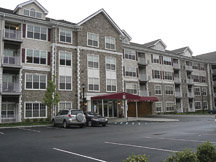If State Sen. Ray Lesniak gets his way, Secaucus and other similar communities across the state will be able to block new affordable housing developments in their towns.
Under a bill he introduced last month with fellow State Sen. Christopher Bateman, the New Jersey Council on Affordable Housing (COAH) would be abolished. Oversight of affordable housing policy would be shifted to the State Planning Commission, and current affordable housing mandates could be eliminated.
The impact could be significant for Secaucus. Under COAH requirements, the town is currently required to create about 303 affordable housing units by 2018, a number that town officials have long argued would burden the local school system and municipal services.
“By de-linking investments in job creation from affordable housing, the legislation removes a significant impediment to job creation and economic recovery.” – State Sen. Ray Lesniak
________
Supporters of the bill believe it will foster affordable housing growth in areas that need it most without burdening municipalities and developers.
Housing advocates fear, however, that if passed the bill will exacerbate racial and economic segregation.
Current laws
Secaucus has fought against many affordable housing mandates in the past few years.
In an affordable housing plan sent to COAH, the town stated that “land use compatibility is a serious problem in Secaucus because it has been designated for high intensity commercial and industrial uses for many decades… Secaucus is also at the point in history when land inventories are low and more development is occurring as redevelopment.”
Currently, COAH sets minimum affordable housing quotas for municipalities and periodically updates its formula as to how those quotas should be met. COAH most recently updated its formula in June 2008. That is when it told Secaucus that it needs 303 more units.
Statewide, COAH wants to see 115,000 new affordable housing units built by 2018.
Under the guidelines released two years ago, municipalities are responsible for ensuring that developers construct one unit of affordable housing for every four units of market-rate housing. Those guidelines increased the percentage of housing units that must be affordable in a development from roughly 11 percent to 20 percent. COAH guidelines also call for the construction of one affordable housing unit for every 16 jobs created within a municipality.
The state defines affordable housing as units that are sold or rented at below-market rates to people whose income meets regional guidelines established by COAH.
Many officials and people in the business community found these requirements too onerous.
‘A real burden’
“Businesses have to pay an impact fee to us for every 16 jobs they create,” said Secaucus town Administrator David Drumeler last week. “That becomes a real burden, especially in these tough economic times. That fee can sometimes be the difference between breaking even or not.”
When former Gov. Jon Corzine cut the amount of impact fee money businesses had to pay to municipalities, towns cried foul since they relied on those dollars to offset costs for municipal services.
“Under the current affordable housing laws, the cost of compliance is significant,” Sen. Lesniak said recently. “And for what, when [this bill] can achieve better results without the bureaucratic costs? By de-linking investments in job creation from affordable housing, the legislation removes a significant impediment to job creation and economic recovery.”
Anywhere but here?
The advocacy group Fair Share Housing plans to lobby against the Lesniak-Bateman legislation. The organization claims that if passed, wealthier communities would pay poorer ones to take on their affordable housing quotas.
“The legislation is unconstitutional and is a violation of [a court ruling] that towns can’t choose to exclude working folks from their housing stock and that zoning decisions have to be made on a regional basis. Not based on NIMBY-ism,” said Kevin Walsh, staff attorney with Fair Share Housing, using the popular acronym for “Not in my backyard.”
Suburban communities like Secaucus, Walsh added, would consider it “a small price” to pay $25,000 to $35,000 per unit to shift their quotas to cities like Jersey City or Newark, fees that are called regional contribution agreements.
Lesniak disagreed with this assessment.
“COAH has had 25 years of failure, producing an average of 2,000 affordable housing units a year. The limited grandfathering of RCAs is designed to spur housing much needed in urban communities like Jersey City, Trenton, Elizabeth, Perth Amboy, Camden, communities where I grew up and live in,” Lesniak responded. “Also, the low income affordable housing allowed to be transferred is very limited. The majority [of affordable housing that can be transferred under the proposed legislation] has to be median income and workforce housing.”
On Thursday, Steve Lonegan, the state director of the taxpayer advocacy group Americans for Prosperity, announced that the organization will join the ranks of those opposing the changes. The organization believes the legislation would create a “more powerful and destructive low-income housing bureaucracy” than what currently exists.
The Economic Growth Committee in the State Assembly, which Lesniak chairs, is currently holding hearings on the legislation, with the next hearing scheduled for Monday, Feb. 8.
E-mail E. Assata Wright at awright@hudsonreporter.com.
